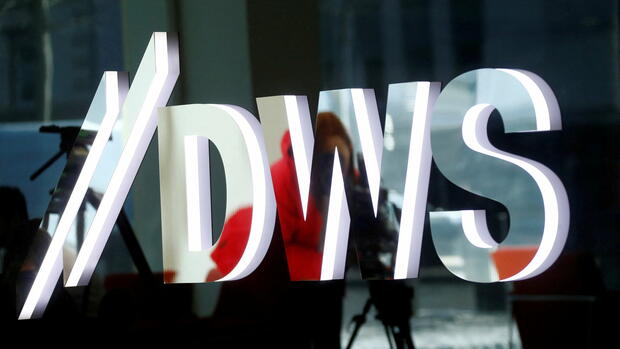Frankfurt The Deutsche Bank fund subsidiary DWS presented weaker results for the start of the year. Adjusted pre-tax profit fell in the first quarter compared to the same quarter last year by 26 percent to 206 million euros. Compared to the previous quarter, profits fell by 19 percent.
Adjusted revenues fell 12 percent year-on-year to EUR 610 million due to lower management and transaction fees. Compared to the previous quarter, earnings fell by four percent.
DWS previously announced that adjusted earnings before taxes are expected to be lower this year of transition due to higher costs for DWS’ transformation. The fund provider confirmed its outlook for the year. On Thursday morning, the DWS share was around three percent in the red.
After a year with high capital outflows of almost 20 billion euros on balance, DWS collected 5.7 billion euros net again in the first quarter. Without outflows from money market funds at the beginning of the year, investors put a total of 8.8 billion euros in new money into DWS funds. Outflows from money market funds are typical at the beginning of the year, because lenders withdraw their money from there at the end of the year to make other investments.
Above all, mixed funds from different securities attracted capital amounting to 5.6 billion euros. DWS reports on a new mandate from a major investor. The passive index funds ETF also recorded net inflows of 4.4 billion euros. New money of several hundred million euros each found its way into active bond and equity funds, i.e. managed by fund managers. By contrast, 1.4 billion euros flowed out of alternative funds.
Mixed first quarter for the industry
The fund analysis house Morningstar speaks of a mixed first quarter for the industry in retail funds in Europe, in which private as well as professional investors invest: Passive funds in particular attracted new capital, while mixed funds, alternative strategies and active equity funds lost investor capital. Bond funds were in demand.
>> Read also: These are the best managed funds
DWS boss Stefan Hoops commented: “In a turbulent market environment, customers have trusted our performance and our advice. Thanks to their continued demand, we saw net inflows again in the first quarter and increased our assets under management.”
The managed assets of the largest German fund provider for private investors increased in the first quarter by 20 billion euros to 841 billion, mainly thanks to price gains and inflows. Compared to the same quarter of the previous year, however, the assets are seven percent lower, which led to the lower management fees related to them.
The management fee margin has decreased slightly compared to the end of 2022 from 0.281 to 0.277 percentage points. Investors’ growing preference for cheap ETFs is constantly squeezing margins.
Adjusted costs fell by one percent year-on-year to EUR 404 million. CFO Claire Peel emphasizes in this context that DWS has maintained its strict cost management.
Cost/income ratio increased significantly
Compared to the previous quarter, however, the costs increased by six percent. DWS justifies this with higher personnel expenses after the reversal of profit sharing related to future performance fees for alternative funds had a cost-reducing effect at the end of 2022.
The adjusted cost-income ratio (CIR) rose significantly to 66.3 percent in the first quarter of 2023, from 59.5 percent a year ago and 60 percent at the end of 2022. The fund company justifies this with the technical separation from the parent company, the lead to the fund house operating on a dual platform and at the same time building up its own capacities there. Peel sees DWS planning to achieve a CIR of 65 percent this year.
The company’s stock is down on Thursday.
(Photo: dpa)
Consolidated profit after tax fell by 26 percent compared to the first quarter of 2022 to 138 million euros. According to DWS, it increased by 29 percent compared to the fourth quarter as a result of a tax-reducing impairment.
Strategically, DWS highlights that it has extended its partnership with Japanese insurer Nippon Life for another five years. This also in order to increase the reach of sales in Asia and to promote product innovations. In India, 600 new employees were integrated into DWS, which should contribute to the goal of becoming an independent wealth manager there.
Furthermore, DWS wants to invest more in strategies in European infrastructure for German private investors. On Tuesday, DWS also announced a strategic partnership with digital currency specialist Galaxy Digital to enter the crypto business.
Management change at Deutsche Bank
As of November, James von Moltke will probably take over DWS from the outgoing Karl von Rohr on the Deutsche Bank Board of Management. The bank’s CFO will also be responsible for the asset management of the bank, which is almost 80 percent owned by Deutsche Bank.
>> Read also: Deutsche Bank reviews external board chairman for DWS
A new head of the supervisory board is still being sought, since von Rohr does not want to extend his contract, which expires in the fall. In financial circles it is said that Deutsche Bank is looking externally for a successor.
In addition to the replacement of the chairman of the supervisory board, investors are waiting for the official investigations in Germany and the USA into the suspicion that DWS has presented itself as more sustainable than it is to be completed. DWS has always denied allegations by a former employee.
Hoops said in an interview with the Handelsblatt at the end of the year: “In retrospect, you can already see that there was exuberant marketing on the subject of sustainability for a while.” dollar area.
More: Deutsche Bank is reorganizing its board of directors – US boss Riley is moving to Santander
